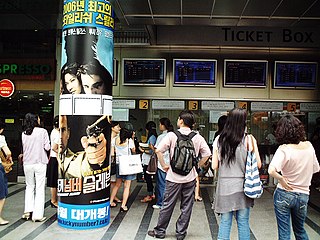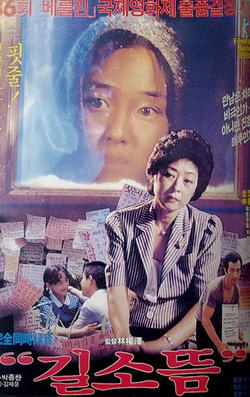| Lists of South Korean films by year |
|---|
 |
| Korean Animation |
A list of films produced in South Korea in 1986:
| Lists of South Korean films by year |
|---|
 |
| Korean Animation |
A list of films produced in South Korea in 1986:

Im Kwon-taek is one of South Korea's most renowned film directors. In an active and prolific career, his films have won many domestic and international film festival awards, as well as considerable box-office success, and helped bring international attention to the Korean film industry. As of spring 2015, he has directed 102 films.

Naju is a city in South Jeolla Province, South Korea.

Pony Canyon Inc., also known by the shorthand form Ponican, is a Japanese company, established on October 1, 1966, which publishes music, DVD and VHS videos, movies, and video games. It is affiliated with the Japanese media group Fujisankei Communications Group. Pony Canyon is a major leader in the music industry in Japan, with its artists regularly at the top of the Japanese charts. Pony Canyon is also responsible for releasing taped concerts from its artists as well as many anime productions and several film productions.

The South Korea national football team represents South Korea in men's international football and is governed by the Korea Football Association. South Korea has emerged as a major football power in Asia since the 1980s, having participated in ten consecutive and eleven overall FIFA World Cup tournaments, the most for any Asian country. Despite initially going through five World Cup tournaments without winning a match, South Korea became the first Asian team to reach the semi-finals when they co-hosted the 2002 tournament with Japan. South Korea also won two AFC Asian Cup titles, and finished as runners-up on four occasions. Furthermore, the team won three gold medals and three silver medals at the senior Asian Games.

Memories of Murder is a 2003 South Korean crime thriller film directed by Bong Joon-ho, from a screenplay by Bong and Shim Sung-bo, and based on the 1996 play Come to See Me by Kim Kwang-rim. It stars Song Kang-ho and Kim Sang-kyung. In the film, detectives Park Doo-man (Song) and Seo Tae-yoon (Kim) lead an investigation into a string of rapes and murders taking place in Hwaseong in the late 1980s.
Jang Sun-woo is a South Korean film director.

Shin Sang-ok was a South Korean filmmaker with more than 100 producer and 70 director credits to his name. His best-known films were made in the 1950s and 60s, many of them collaborations with his wife Choi Eun-hee, when he was known as "The Prince of South Korean Cinema". He received posthumously the Gold Crown Cultural Medal, the country's top honor for an artist.

Choi Eun-hee was a South Korean actress, who was one of the country's most popular stars of the 1960s and 1970s. In 1978, Choi and her then ex-husband, movie director Shin Sang-ok, were abducted to North Korea, where they were forced to make films until they sought asylum at the U.S. embassy in Vienna in 1986. They returned to South Korea in 1999 after spending a decade in the United States.

The cinema of North Korea began with the division of Korea and has been sustained since then by the ruling Kim dynasty. Kim Il-sung and his successor Kim Jong-il were both cinephiles and sought to produce propaganda films based on the Juche ideology.

South Korean films have been heavily influenced by such events and forces as the Korea under Japanese rule, the Korean War, government censorship, the business sector, globalization, and the democratization of South Korea.
Song is a Korean family name derived from the Chinese surname Song. Songs make up roughly 1.4% of the Korean population; the 2000 South Korean census found 622,208 in that country.

Jung is a Latin alphabet rendition of the Korean family name "정", also often spelled Jeong, Chung, Joung or Jong. As of the South Korean census of 2015, there were 2,407,601 people by this name in South Korea or 4.84% of the population. The Korean family name "정" is mainly derived from three homophonous hanja. 鄭 (2,151,879), 丁 (243,803) and 程 (11,683). The rest of the homophonous hanjas include: 政 (139), 桯 (41), 定 (29), 正 (22) and 情 (5).
This is a list of films by year produced in the country of South Korea which came into existence officially in September 1948. The lists of Korean films are divided by period for political reasons. For earlier films of united Korea see List of Korean films of 1919–1948. For the films of North Korea see List of North Korean films. For an A-Z list of films see Category:Korean films.

Shin Seong-il was a South Korean actor, film director, producer, and former politician. A legendary actor with 500 films in over 40 years, Shin debuted in director Shin Sang-ok's 1960 film A Romantic Papa and rose to fame through popular youth titles. A star in the 1960s and 1970s, his status as one of Korea's top actors extended well into the 1980s.

Gilsoddeum is a 1986 South Korean drama film directed by Im Kwon-taek. It was entered into the 36th Berlin International Film Festival.
The Korea Creative Content Agency (KOCCA) is a South Korean government agency which is affiliated with the Ministry of Culture, Sports and Tourism and is charged with governing cultural content. As part of its partnership the Export-Import Bank of Korea, the agency provides loans for small companies producing cultural products such as TV shows, films, games and animated series.
Lee Hye-young is a South Korean actress. She is the daughter of celebrated film director Lee Man-hee, who died in 1975 when she was in middle school. Lee began her acting career in 1981 at the age of 18 through a local musical theatre production of The Sound of Music. Since then she has performed in theater, feature and short films, and television. She was one of the most prominent South Korean actresses in the 1980s, starring in films such as The Blazing Sun (1985), Winter Wanderer (1986), Ticket (1986), The Age of Success (1988), North Korean Partisan in South Korea (1990), Fly High Run Far (1991), Passage to Buddha (1993), and No Blood No Tears (2002). Lee also played supporting roles in the Korean dramas I'm Sorry, I Love You (2004), Fashion 70's (2005) and Boys Over Flowers (2009).
Freezing Point is the debut novel of Japanese novelist Ayako Miura, first serialized on Asahi Shimbun between 1964 and 1965. The novel won Asahi Shimbun's Ten Million Yen Award.